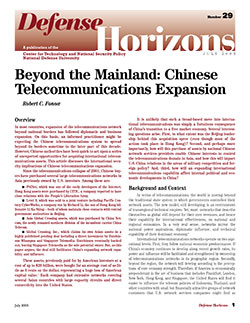DOWNLOAD PDF
 Overview
Overview
In most countries, expansion of the telecommunications network
beyond national borders has followed diplomatic and business
expansion. On this basis, an informed practitioner might be
expecting the Chinese telecommunications system to spread
beyond its borders sometime in the later part of this decade.
However, Chinese authorities have been quick to act upon a series
of unexpected opportunities for acquiring international telecommunications
assets. This article discusses the international security
implications of Chinese telecommunications expansion.
Since the telecommunications collapse of 2001, Chinese buyers
have purchased several large telecommunications networks in
Asia previously owned by U.S. investors. Among these are:
�
- PSINet, which was one of the early developers of the Internet.
Hong Kong assets were purchased by CITIC, a company reported to have
close relations with the People’s Liberation Army.
�
- Level 3, which was sold to a joint venture including Pacific Century
CyberWorks, a company run by Richard Li, the son of Hong Kong billionaire
Li Ka Shing—both of whom maintain close contacts with central
government authorities in Beijing.
�
- Asia Global Crossing assets, which was purchased by China Netcom,
the newly renamed northern division of the incumbent carrier China
Telecom.
�
Global Crossing, Inc., which claims its own Asian assets in a
highly publicized pending deal including a direct investment by Hutchinson
Whampoa and Singapore Telemedia. Hutchinson eventually backed
out, leaving Singapore Telemedia as the sole potential owner. But, as this
paper argues, the deal still facilitates China’s expanding network capability
and influence.
These assets, previously paid for by American investors at a
cost of up to $20 billion, were bought for an average cost of as little
as 3 cents on the dollar, representing a huge loss of American
capital value.1 Each company had extensive networks covering
several Asian countries with large capacity circuits and direct
connectivity into the United States.
It is unlikely that such a broad-based move into international
telecommunications was simply a fortuitous consequence
of China’s transition to a free market economy. Several interesting
questions arise. First, to what extent was the Beijing leadership
behind this acquisition spree (even though most of the
action took place in Hong Kong)? Second, and perhaps more
importantly, how will this purchase of assets by national Chinese
network services providers enable Chinese interests to control
the telecommunications domain in Asia, and how this will impact
U.S.-China relations in the areas of military competition and foreign
policy? And, third, how will an expanding international
telecommunications capability affect internal political and economic
developments in China?
READ MORE >>